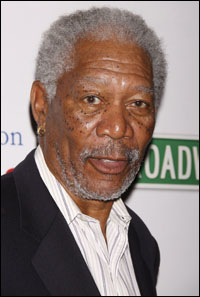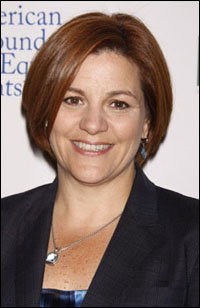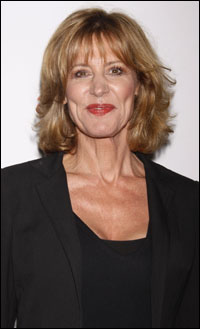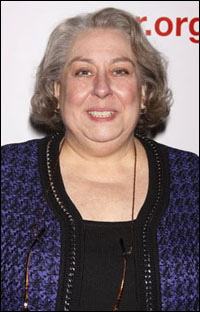
*
What "opened" Sept. 19 at Broadway's Eugene O'Neill Theatre, for that one night only, was a previously secured Pandora's Box of socio-political agitprop — the actual transcripts, massively edited and superbly reenacted, of Perry v. Schwarzenegger, a case brought last year to overturn California's 2008 voter-approved anti-gay Proposition 8.
Rather fittingly, the refried courtroom drama was played out by a starry, conspicuously committed cast of 21 name-brand actors, under the glistening white church arches and stained-glass facades where The Book of Mormon normally works out. The choir they were preaching to, for the most part, was an audience of the converted.
The setting was not altogether a surprise since one of that musical's recent Tony contenders, Rory O'Malley (he's the young Elder who gleefully subscribes to a "Turn It Off" policy of gay discretion), is a founding father of Broadway Impact, an organization favoring marriage equality and formed the minute Proposition 8 passed in California. "It's nice to be in the family house," O'Malley admitted.
This East Coast group joined hands with the Los Angeles-based American Foundation for Equal Rights as sponsors of the evening, and the expected $1 million proceeds are earmarked for AFER and their on-going fight against prejudice. The drama at hand is a now-it-can-be-shown saga of the suit two California couples — Sandy Stier & Kristin Perry and Jeff Zarrillo & Paul Katami — brought to challenge Proposition 8. Theodore B. Olson and David Boies, who famously represented the opposing sides in Bush v. Gore, argued their case successfully before the Republican-appointed Chief Judge Vaughn Walker, who ruled that Prop. 8 unfairly discriminated against homosexuals. (That ruling is now being appealed.)
Those proceedings were originally set to be broadcast live, but the opponents of marriage equality filed an emergency appeal to the U.S. Supreme Court that effectively denied national access to the testimony — until now. One daily visitor to the courtroom took notes, seeing a play in the proceedings, and got the transcripts.
| |
 |
|
| Morgan Freeman | ||
| photo by Joseph Marzullo/WENN |
It was a formidable undertaking. "Those transcripts have more frequent-flyer miles than most bi-coastal businessmen," admitted Black. "I used to carry them with me. All my little pay jobs, I would take another binder — there were many of them — and start finding the gems, finding the things that I thought were personal or humorous — and then, also, places where each side made their best points.
"Thankfully, I was there the entire time throughout the experience. I'm a founding board member of AFER so my first responsibility is to the case, and then when I met Broadway Impact — Rory — he said that if I wrote something he would stage it as a fund-raiser. Really, it was his idea. Then, I signed on and AFER signed on, and it became something that none of us thought it would be when I first met him for coffee."
Now that the play has gotten its act together for its solitary Broadway showing, the plan is to roll it out to the provinces — to college campuses and regional theatres throughout the country for presentation. Foes of marriage equality, said Black, "know that trial did not go well for them. They don't want this seen. I think it's incredibly important that it be seen, that this play act as an outreach of education so it's going on tour — for no charge — so people across the country will know what the arguments are on both sides as it makes this way toward the Supreme Court because there's no state, there's no city, there's nowhere in this country that will not be affected by this U.S. Supreme Court's decision so we all have to know what we're talking about."
8 immediately goes to Northwestern University and the University of Michigan. Productions also are currently being developed at American Repertory Theatre, Williamstown Theater Festival and Carnegie Mellon University.
As world premieres go, 8 had a light turnout of stars. Fran Drescher and Peter Marc Jacobson were very much in evidence, as was Judith Light. "I think this is so extraordinary, I can't wait to see it," Light gushed to the press, "and, of course, it is being directed by Joe Mantello, who's my director of the moment." Come Thursday, she joins him, Stockard Channing, Stacy Keach, Rachel Griffiths and Thomas Sadoski in preparing Jon Robin Baitz's Other Desert Cities for a Nov. 3 date on Broadway.
| |
 |
|
| Christine Quinn | ||
| photo by Joseph Marzullo/WENN |
Like good little converts, the audience sat rapt and riveted as testimonies raced by.
Oscar winner Morgan Freeman, with some Nelson Mandela still clinging to his persona, commanded focus as he fought his usual good fight playing defense attorney Boies — with Spencer Tracy gone, it was hard to quarrel with that casting — even Boies later said Freeman did a better job of the words than he did.
Then, the twice-Tonyed John Lithgow completed the one-two punch of good-guys with a roof-raising summation that busted the applause meter. "It overtook me as I was speaking," he confessed later. "I knew it had to be the final big impact of the play, but, I dunno — something just swept over me. The audience was so with it because it was resoundingly speaking what they wanted to hear said. It was great."
The man he was playing, Olson, admitted that the speech — like much of the play — brought tears to his eyes. "The kind of performance you give in the courtroom is quite different from what you saw on stage, but John did a brilliant job of it."
| |
 |
|
| Christine Lahti | ||
| photo by Joseph Marzullo/WENN |
At play's end, all eight real-life characters were summoned to the stage to take a bow with their impersonators, by Rob Reiner, one of two actors on stage who was a card-carrying director (the other was the judge, Bob Balaban).
Reiner proved himself very much Carl Reiner's boy, delivering a hilarious meathead performance in a meaty cameo: a particularly pedantic Prop. 8 advocate.
Balaban, who made his movie debut as Joe Buck's high-school pickup in "Midnight Cowboy," presided with his customary judicial dignity. No one would suspect he had the shakes from the altitude: "It was very challenging. My judge had to sit on top of a high platform, and I was very afraid that I would fall off at any time."
This didn't prevent him from drawing some droll fun from the judge. "One of the things they said to us, because we did rehearse — today, for a couple of hours — was, 'Don't forget: Funny things did happen in this trial. People laughed in the trial.' We were allowed to get laughs in this because some of it is really funny." He also didn't disguise his attack mode toward the prosecuting attorney, Charles Cooper, played with frazzled exasperation by Bradley Whitford. "I played a vaguely similar judge, actually, in 'Howl,' the movie about Allen Ginsberg, only in that case the judge was much more hidden about his opinions," recalled Balaban. "In this case, this judge does seem to come out, kind of — but, of course, you could have performed it differently. I could have been sweeter, but I decided not to be."
Doubtlessly, Whitford in the hapless role of Cooper appreciated the mercy shown. "Just think what this guy went through," he said. "He's a smart guy. I don't think he ever thought it was going to get to court. I think he thought it was just going to go through the motions. What is striking about the trial is that, once you get into court, not only is he facing the greatest team of lawyers a human being can face, but there is absolutely no argument against civil rights justification for same-sex marriage. So I thought of this guy like the coyote in the roadrunner cartoons where he's running really, really fast and then suddenly realizes, ‘I went over the cliff.' Aw, going down."
| |
 |
|
| Jayne Houdyshell | ||
| photo by Joseph Marzullo/WENN |
Jayne Houdyshell, still basking in her Follies raves, is another who had fun playing the devil's advocate — in this case, Maggie Gallagher, a strident pro-Prop. 8-er. Her first four words — "The bottom line is" — brought the house down. "I had no idea that that line would get the response it did. But it was a nice way to start the moment. I was very flattered and happy when I was asked to do this because I think it's a really glorious project and needs to be done, and I hope it's done all across the country. It's a brilliant idea to present it in this way so people can see and cheer up-close a personal and historic moment in our country."
O'Malley wangled himself a character in the evening, Ryan Kendall. "I just met him yesterday," he said, "a very strong, amazing individual with a sense of humor and a lot of compassion and courage who's sharing his story about going through conversion therapy because his family wanted him to change who he was."
Stepping outside his immediate acting circle and getting a good look at the cast assembled, he called it "a dream come true — mostly because I have been watching so many of these actors as a kid growing up. It means so much for them to support this issue. So many of them are straight actors whom I really look up to."
Manning other real-life roles were over-qualified worthies like Yeardley Smith, Kate Shindle, Anthony Edwards, K. Todd Freeman, Ken Leung, Larry Kramer, Campbell Brown and Stephen Spinella.
Court adjourned for a festive little after-party at Gotham Hall at Broadway and 36th. A full compliment of press greeted the celebrities like a regular Broadway opening.
Hair's Tony-nominated Gavin Creel, a co-founder of Broadway Impact with Jenny Kanelos and O'Malley, was predictably pleased with the event. "The thing that makes this unique for me," he said, "is that these words were all said under oath in a Federal Court. These are not interpretations. This is not a 'Law & Order' episode. I think it's easy for American people — when they see this play across the country, they're going to think, 'Oh, this is like a court case.' No, this is the court case. This is what they said under oath. Morgan Freeman had that great thing where he said, 'When you bring them in front of a court, they can't lie.' They're under oath, bound to say what they believe. The opposition withers."
Bomer was happy to see the play heading for the hinterlands. "I think the really important thing about this play — and when it's really going to be important — is when it's done in the Red States to audiences who aren't all open-minded, when it can really start to change some minds rather than just a force of nature. I think this was a perfect place to birth it because no one had heard these transcripts and people needed to hear how completely poor and shabby and idiotic the closing argument was. This was a great place to get that started. Now, it's going to go to other places where we can really start to open, and change, some minds."








































